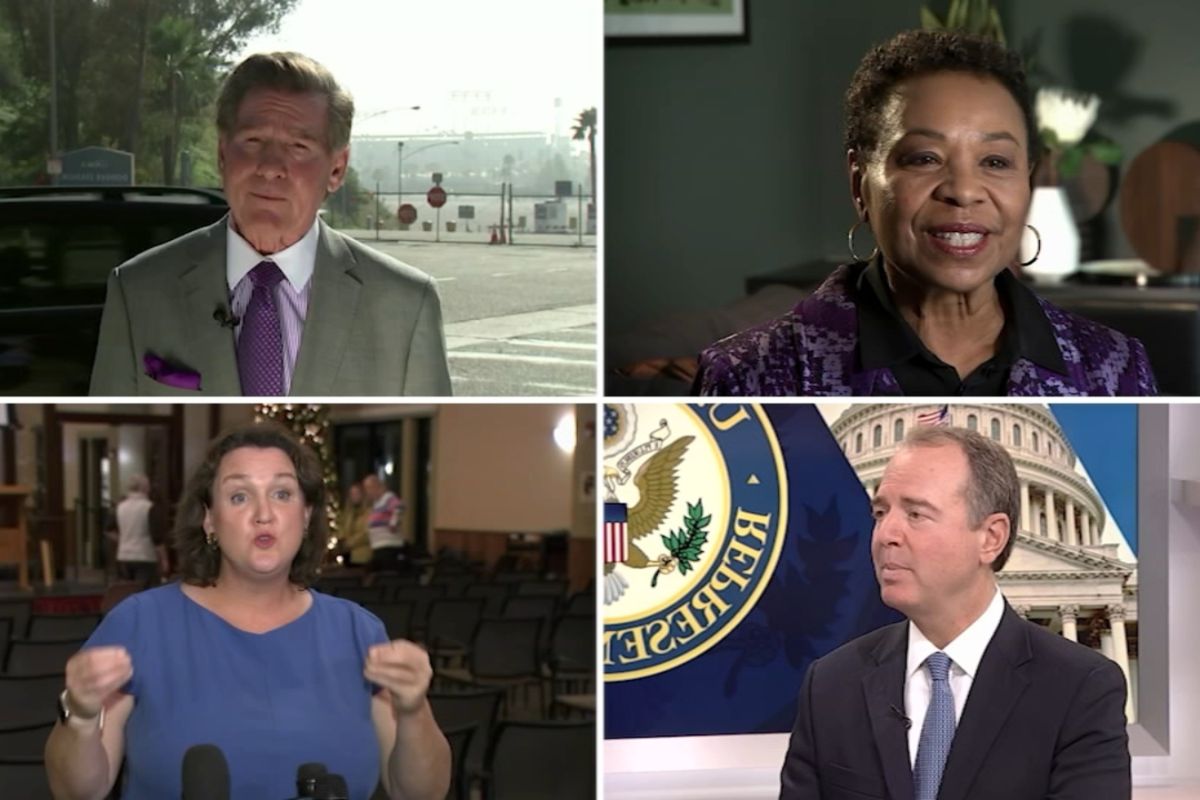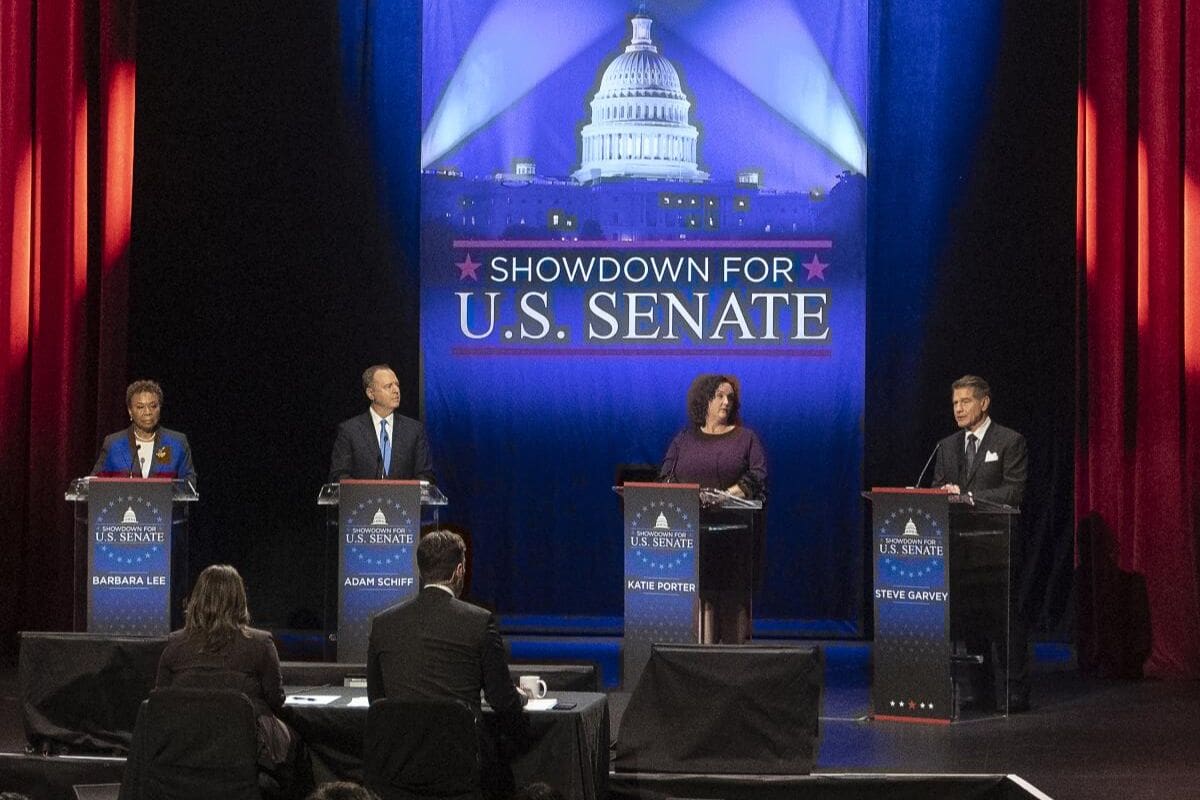Candidates for the California Senate Engage: So, you’re in for a treat as the California Senate candidates gathered for their second debate, each one surely bringing a fresh perspective to the fore.
The stakes are high, and the air is charged with promises and policies. As the contenders articulate their visions for the state, the tension mounts, and the audience is left wondering which candidate will emerge victorious in this crucial race.
The issues at hand are pressing, and the competition is fierce, making every argument and rebuttal pivotal in the quest for Senate glory.
Key Takeaways
- Housing affordability and construction are top priorities for California Senate candidates.
- Bay Area challenges include community policing and building trust with law enforcement.
- Republican candidate focuses on transparency and accountability in addressing homelessness.
- Democratic candidate Katie Porter champions progressive values like healthcare and climate change reforms.
California Senate Race Debate Highlights Key Issues
The California Senate race debate highlighted crucial issues facing the state, with housing affordability emerging as a top priority. Frontrunner Congressman Adam Schiff stressed the urgent need for the construction of hundreds of thousands of housing units to address the state’s housing crisis.
As the candidates engaged in a lively discussion in San Francisco, the focus on housing affordability resonated strongly with voters, reflecting the pressing concerns of many Californians. The debate a range of statewide and national issues, demonstrating the complexity of the challenges at hand.
With three Democrats and one Republican participating, diverse perspectives were presented on how best to tackle the housing crisis and other key issues affecting California. The candidates’ insights and proposed solutions shed light on the multifaceted nature of the problems facing the state, setting the stage for a competitive and issue-driven race leading up to the March primary.
Candidates’ Perspectives on Bay Area Challenges
During the debate, candidates shared their unique viewpoints on the challenges facing the Bay Area, particularly focusing on issues related to crime and public safety in Oakland. Congresswoman Barbara Lee emphasized the significance of addressing underlying causes, advocating for a national assault weapons ban to combat crime effectively. Lee’s perspective resonated with many, highlighting the need for comprehensive solutions beyond just surface-level measures.
Other candidates the complexities of community policing, stressing the importance of building trust between law enforcement and residents to enhance public safety. The discourse underscored the multifaceted nature of the challenges faced by the Bay Area, emphasizing the need for holistic approaches that consider both immediate interventions and long-term strategies.
As the debate unfolded, it became clear that the candidates all recognized the urgency of addressing these issues and were committed to finding sustainable solutions to ensure the well-being of Oakland residents.
Republican Candidate’s Stance on Homelessness Crisis
Steve Garvey, the sole Republican candidate, highlighted concerns about California’s approach to the homelessness crisis, emphasizing the necessity of conducting a comprehensive audit to evaluate the efficacy of allocated funds. When addressing this critical issue, Garvey’s stance includes the following key points:
- Transparency: He advocates for complete transparency in the allocation and utilization of funds designated for addressing homelessness.
- Accountability: Garvey stresses the importance of holding government agencies accountable for the outcomes of the programs and initiatives aimed at tackling homelessness.
- Efficiency: He emphasizes the need for a streamlined and efficient process to ensure that resources are effectively utilized to combat the homelessness crisis.
- Evaluation: Garvey proposes a thorough evaluation mechanism to measure the impact of interventions and make data-driven decisions to enhance the effectiveness of homelessness policies.
Also Read: Three Injured in Brawl at Southern California Motorcycle Festival
Progressive Record and Platform of Democratic Candidate Katie Porter
With her unwavering commitment to progressive values, Katie Porter has consistently championed policies that resonate with the needs of Californians. As a Representative, Porter emphasized her progressive record, urging voters to consider her based on key issues. She positioned herself as the candidate dedicated to bringing change to Washington and addressing California’s pressing concerns.
Porter has actively advocated for issues like healthcare reform, income inequality, and climate change mitigation. Her platform includes supporting Medicare for All, raising the federal minimum wage, and implementing measures to combat climate change. Porter’s progressive stance aligns with the desires of many Californians who prioritize social justice and environmental sustainability.
Importance of California Primary in Wide-Open Senate Race
Porter’s progressive platform and record are poised to play a pivotal role in the upcoming California primary, given the heightened significance of the wide-open Senate race. Here’s why you should pay close attention to the California primary:
- Critical Primary: With the Senate seat up for grabs, the California primary on March 5 becomes a crucial battleground for candidates to secure their spots in the general election runoff.
- California’s System: Political science professor Melissa Michelson emphasizes that California’s primary system often makes the primary more decisive than the general election.
- Top Two Runoff: Michelson predicts that the top two candidates emerging from the primary will likely be the ones who ultimately triumph in the statewide election.
- Strategic Voting: Voters must carefully consider their choices in the primary, as the outcomes will significantly impact the trajectory of the Senate race.
Conclusion Of Candidates for the California Senate Engage
The California Senate race debate, consider the candidates’ perspectives on key issues like homelessness and Bay Area challenges.
With the primary approaching in March, the importance of this race can’t be overstated.
Stay informed and engaged as you decide who’ll represent you in the Senate.
Your vote matters in shaping the future of California.
Our Reader’s Queries
What time is CA Senate debate?
The debate, moderated by Inside California Politics hosts Frank Buckley and Nikki Laurenzo, is set for one hour, commencing at 7 p.m. Pacific Standard Time.
What is the morning hour in the Senate?
The Morning Hour signifies the initial two hours of a fresh legislative day, commencing when the Senate convenes on a new calendar day after an adjournment. Following the reading of the Journal or dispensing with its reading, the Senate proceeds with its morning business as per the rules.
How does CA State Senate work?
Senate members serve four-year terms, with those from odd-numbered districts seeking election during presidential election years. Colleagues from even-numbered districts run for office simultaneously with California’s constitutional officers.
What are the rules for cloture in the Senate?
To initiate cloture, at least 16 senators must sign a motion stating, “We, the undersigned Senators, in accordance with the provisions of Rule XXII of the Standing Rules of the Senate, do hereby move to bring to a close debate on [the measure].”


